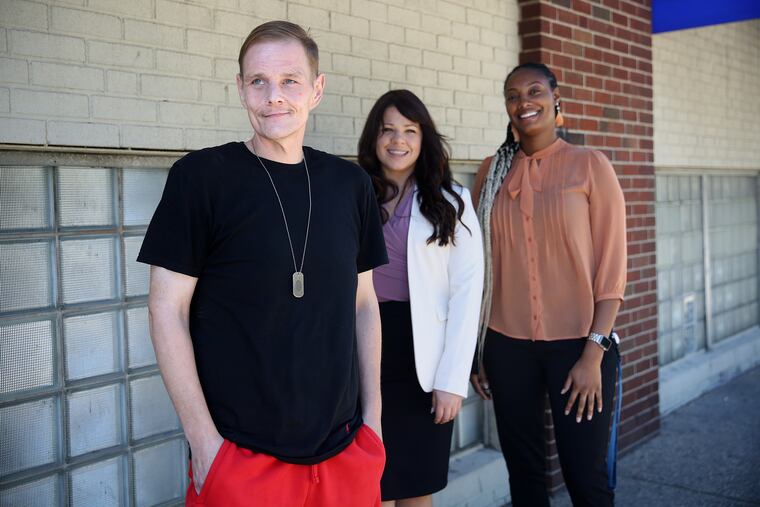For people in recovery, it’s tough to find work. New programs are helping.
The same stigma against addiction that keeps people from getting help can also follow people into the workforce once they recover.

In fall of 2017, Jackie Somes was months into recovery from drug addiction, doing well in a Delaware County recovery home. She wanted to rebuild her life and re-enter the workforce. But like so many others in the region, she was about to face another set of challenges on the road to overcoming addiction.
The same stigma that keeps people in addiction from getting help can also follow them once they’ve recovered. Even with years drug-free, job-seekers with a history of addiction can find themselves trying to explain gaps in resumés or facing the judgment of potential employers.
And for Somes, half the battle was with herself: When you’re in addiction, "you lose a lot of pride, self-esteem, self-worth,” she said. “It’s hard to believe in yourself.”
Then her recovery house launched a pilot program to help the women it served get meaningful employment.
Two years later, the pilot has expanded to cover all of Delaware County. And Somes, one of its first graduates, is running a similar program in Philadelphia.
In a city where health officials estimate that tens of thousands of people are using heroin and fentanyl, Somes and other advocates say addiction treatment must also focus on employment, because a job can contribute to the stability needed to maintain recovery.
Christine Corson, director of the women’s program at MVP Recovery — the private recovery home that launched Delaware County’s program with the workforce development company EDSI — said she reached out to county officials in 2017 after noticing that her female clients had trouble getting hired.
Before they fell into addiction, many of the men at MVP’s programs were employed in trade unions — which often have well-established recovery programs for employees — and found they were often able to return to those jobs, Corson said. But women were mostly going it alone, she said, and struggling with the guilt and shame that can come from a criminal record or years spent in addiction without a job.
» READ MORE: In Philadelphia’s building trades, construction workers are helping their colleagues battle addiction
“You don’t know who you are when you first get sober,” Somes said. “And in early recovery, your emotions are so raw.” Rejections were especially demoralizing, she said.
But by the end of 2017, Somes had gotten a job with EDSI that eventually led to her helming the jobs program run through PA CareerLink at Merakey Parkside Recovery, a methadone clinic in West Philadelphia.
Students from Merakey’s second group of trainees graduated from the program this summer.
“I wasn’t employable because I didn’t believe I was,” Kenneth Harris told the room at graduation, adding that he’d had to be “dragged to the clinic kicking and scratching.” Somes, he said, had been “a ray of light," showing her students that the stability they hoped for was possible.
Participants learned how to write resumés and rehearsed interviews. They also spoke about how to disclose their history of addiction to employers. Some, for the first time in years, began to think about a job as a vocation rather than quick cash for a fix. Several graduates have trained to become certified peer specialists — outreach workers who help people with addiction navigate the treatment system.
» READ MORE: After confronting mental illness and addiction, he wants to help others
Andrew Glinka, 37, one of the program’s most recent graduates, grew up in Northeast Philadelphia and began using drugs as a teenager, eventually falling into addiction to prescription pills and, later, heroin. His father dealt drugs, he said: “That’s what I aspired to do. I thought the streets were my job.”
Now, after taking a skills assessment test as part of his jobs program, Glinka will soon begin training for a job in early childhood education. He remembers the impact of the social workers and teachers who looked out for him as a child, he said.
Merakey’s program is a pilot, but Somes and Monique Veney, the clinic’s clinical supervisor, said they’re hoping to expand. Seven participants graduated from the program earlier this year, and 10 more completed the program in August. Of the August graduating class, two have already found jobs, and four are entering training programs to get certification in specific careers.
The goal, Veney said, is to stay in touch with graduates as they search for employment and even after they find jobs. “It’s difficult to reintegrate back into the community, to get back to where you need to be,” she said. “You’re going from one end of the spectrum to another. There’s so much stress.”
Somes said the act of working has helped her own recovery.
“Working gives me a purpose,” she said. “I see a future. I think it’s very important for employers to give people who are in recovery a second chance, because I think that they can be some of the best employees. They have something to prove to themselves — and they want to prove it to you, too.”